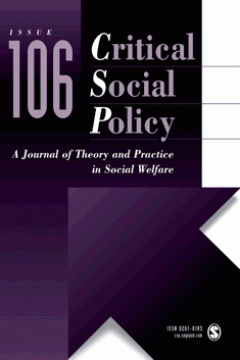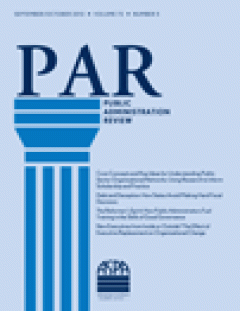Filter by

‘Social inclusion’ through sports-based interventions?
There is international enthusiasm for the idea that sport can contribute to �social inclusion� strategies. Sport now features in various targeted youth initiatives, including �Positive Futures�: a �sport and activity based social inclusion programme� currently operating in England and Wales. The processes through which these �sports-based interventions� might promote �social inclusion� require,…
- Edition
- Vol. 31 no. 1, February 2011.pp. 126-150
- ISBN/ISSN
- 02610183
- Collation
- -
- Series Title
- Critical Social Policy
- Call Number
- -

Strategic Corporate Social Responsibility and Environmental Sustainability
The authors review three theoretical approaches to strategic corporate social responsibility (CSR), which can be defined as voluntary CSR actions that enhance a firm�s competitiveness and reputation. The end result of such activities should be an improvement in financial and economic performance. Based on an overview of recent empirical evidence, the authors conclude that economic theories of s…
- Edition
- Vol. 50 no. 1, March 2011.pp. 6-27
- ISBN/ISSN
- 00076503
- Collation
- -
- Series Title
- Business & Society
- Call Number
- -

Conditions for Value Creation in the Marketplace Through the Management of CS…
This article contributes to research on strategic corporate social responsibility (CSR) by detailing the condition-sets governing the emergence of market-led demand for CSR. We build on external effects theory to evaluate the strategic options a company can adopt to manage its negative external effects in a way that creates social and economic value. We draw on the economic concepts of rivalry …
- Edition
- Vol. 50 no. 1, March 2011.pp. 28-49
- ISBN/ISSN
- 00076503
- Collation
- -
- Series Title
- Business Society
- Call Number
- -

Organizational Commitment in Manufacturing Employees : Relationships With Cor…
Despite the numerous forays into understanding the concept and consequences of Corporate Social Performance (CSP), very little is known about how CSP impacts employees. In response, this study examines the relationship between employee perceptions of CSP and organizational commitment in a manufacturing industry setting. Survey data are collected from 136 production employees at three kitchen ca…
- Edition
- Vol. 50 no. 1, March 2011.pp. 50-70
- ISBN/ISSN
- 00076503
- Collation
- -
- Series Title
- Business Society
- Call Number
- -

Measuring Environmental Strategy : Construct Development, Reliability, and Va…
Inconsistent results in prior work that link environmental strategy to competitive advantage may be due to the empirical difficulties of marrying the theoretical connection between a firm�s resource base and its environmental strategy. The authors contribute to the field by developing a measure that is congruent with the natural resource�based view, a dominant paradigm in this line of work. Thi…
- Edition
- Vol. 50 no. 1, March 2011.pp. 71-115
- ISBN/ISSN
- 00076503
- Collation
- -
- Series Title
- Business Society
- Call Number
- -

Under the Tip of the Iceberg: Absorptive Capacity, Environmental Strategy, an…
Although existing research evaluates how the adoption of proactive environmental strategies affects corporate performance, there is little understanding of the organizational mechanisms that link such strategies to competitive advantage. It is, therefore, unclear how environmental strategies relate to other management strategies that could lead to a competitive advantage. In this article, we an…
- Edition
- Vol. 50 no. 1, March 2011.pp. 116-154
- ISBN/ISSN
- 00076503
- Collation
- -
- Series Title
- Business Society
- Call Number
- -

Domesticating Radical Rant and Rage : An Exploration of the Consequences of E…
This article examines the effect of social shareholder activism on one of the most visible aspects of corporate social behavior, namely corporate pollution management practice. Social shareholder activism is a distinct form of social movement that engages firms �in the suites.� We theorize the effect of social shareholder activism using three social movement mechanisms: (a) disruption of routin…
- Edition
- Vol. 50 no. 1, March 2011.pp. 155-188
- ISBN/ISSN
- 00076503
- Collation
- -
- Series Title
- Business Society
- Call Number
- -

Green Governance : Boards of Directors’ Composition and Environmental Corpo…
This study contributes to the work on board composition and firm corporate social responsibility by extending it to the environmental domain. It evaluates the relationship between boards of directors� composition and environmental corporate social responsibility (ECSR) by integrating literatures on board composition, firm corporate social responsibility, and individual differences in attitudes …
- Edition
- Vol. 50 no. 1, March 2011.pp. 189-223
- ISBN/ISSN
- 00076503
- Collation
- -
- Series Title
- Business Society
- Call Number
- -

Public Maternalism Goes to Market : Recruitment, Hiring, and Promotion in Pos…
Under what conditions do motherhood penalties emerge in countries undergoing transition from state socialism to capitalism? This analysis identifies the ways managers in global financial firms employ gendered assumptions in constructing and implementing labor practices among highly skilled professional workers in Hungary. Relying on 33 in-depth interviews with employers as well as interviews wi…
- Edition
- Vol. 25 no. 1, February 2011.pp. 5-26
- ISBN/ISSN
- 00438871
- Collation
- -
- Series Title
- Gender & Society
- Call Number
- -

Gender in Context, Content, and Approach : Comparing Gender Messages in Girl …
I explore gender messages in Boy Scout and Girl Scout handbooks through an analysis of how gender is infused in the context and content of Scout activities as well as in instructions about how the Scouts are to approach these activities. I find that girls are offered more activities intended to be performed in group contexts than are boys. Boys are offered proportionately more activities with s…
- Edition
- Vol. 25 no. 1, February 2011.pp. 27-47
- ISBN/ISSN
- 08912432
- Collation
- -
- Series Title
- Gender & Society
- Call Number
- -

Culture Change Refined and Revitalized : The Road Show and Guides for Pragmat…
Despite a declining interest in the relationship between leadership, culture, and performance in the scholarly literature, culture change is alive and well among leaders in the public sector as a means to improve performance. This essay reviews the trajectory of culture studies and proposes a modest model of organizational culture that sets aside many of the conceptual and methodological argume…
- Edition
- Volume 70, Issue 6, November/December 2010, pages
- ISBN/ISSN
- 00333352
- Collation
- -
- Series Title
- Public Administration Review
- Call Number
- -

Leadership and Organizational Culture : Sustaining Dialogue between Practitio…
Few topics in the study of contemporary public organizations better illustrate the burdens�and potential benefits�of sustaining dialogue between practitioners and scholars than the interplay between leadership, organizational culture, and public sector performance. Following two decades of intensive research and advocacy, the last 10 years have seen diminished scholarly attention to this subjec…
- Edition
- Volume 70, Issue 6, November/December 2010, pages
- ISBN/ISSN
- 00333352
- Collation
- -
- Series Title
- Public Administration Review
- Call Number
- -

The Changing Nature … and Costs … of Election Administration
Changes during the last decade have significantly altered the nature of election administration and driven up its costs. Interviews with practitioner representatives from the elections community reveal a number of issues that continue to influence this field. Expense data from two counties illustrate how policy changes affect election costs. Scheduled ending of federal funding threatens a �perf…
- Edition
- Volume 70, Issue 6, November/December 2010, pages
- ISBN/ISSN
- 00333352
- Collation
- -
- Series Title
- Public Administration Review
- Call Number
- -

Overcoming the Barriers to Cooperation : Intergovernmental Service Agreements
Interlocal cooperation through service-sharing agreements has a long history, but its use has increased in popularity during the last 20 years. The decisions of local government units to collaborate through intergovernmental service agreements are best understood as a two-stage process. The first stage, in which communities decide whether to consider interlocal cooperation, involves the nature …
- Edition
- Volume 70, Issue 6, November/December 2010, pages
- ISBN/ISSN
- 00333352
- Collation
- -
- Series Title
- Public Administration Review
- Call Number
- -

“Not Imminent in My Domain!” County Leaders’ Attitudes toward Eminent D…
Eminent domain is an urgent problem facing local government administrators and scholars throughout the United States. However, the literature is sparse regarding how local leaders make decisions on this hot-button issue. A 2006 Government Accountability Office report noted a lack of data about local governments� use of their eminent domain authority. A survey of county managers in North Carolin…
- Edition
- Volume 70, Issue 6, November/December 2010, pages
- ISBN/ISSN
- 00333352
- Collation
- -
- Series Title
- Public Administration Review
- Call Number
- -

Alternative Methods of Service Delivery in Small and Rural Municipalities
Data from approximately 1,000 small, mostly rural municipalities in Illinois, New Hampshire, and Wisconsin address local choices on production and contracting arrangements for a wide range of services. The results suggest that the use of both for-profit contractors and cooperative agreements with other governments correlate negatively with population size. Small municipalities are less likely t…
- Edition
- Volume 70, Issue 6, November/December 2010, pages
- ISBN/ISSN
- 00333352
- Collation
- -
- Series Title
- Public Administration Review
- Call Number
- -

Understanding Business Improvement Districts : A New Governance Framework
What is the current state of research on business improvement districts (BIDs)? What is an appropriate framework for analysis? What are key questions for advancing future BID research? BIDs can be understood best within a network governance framework. The research shows, first, a blurring of the line between the public and private spheres as a result of BIDs; second, BIDs are increasingly impor…
- Edition
- Volume 70, Issue 6, November/December 2010, pages
- ISBN/ISSN
- 00333352
- Collation
- -
- Series Title
- Public Administration Review
- Call Number
- -

The Latin American Left's Mandate : Free-Market Policies and Issue Voting in …
The rise of the left across Latin America is one of the most striking electoral events to occur in new democracies during the last decade. Current work argues either that the left's electoral success stems from a thoroughgoing rejection of free-market policies by voters or that electorates have sought to punish poorly performing right-wing incumbents. Whether the new left has a policy or perfor…
- Edition
- Volume 63, Issue 01, January 2011. pp 43 -77
- ISBN/ISSN
- 00438871
- Collation
- -
- Series Title
- World Politics
- Call Number
- -

Gonna Party Like It's 1899 : Party Systems and the Origins of Varieties of Co…
This article explores the origins of peak employers' associations to understand why countries produce highly centralized macrocorporatist groups, weaker national associations but stronger industry-level groups, or highly fragmented pluralist associations. The authors suggest that the structure of partisan competition played a vital causal role in the development and evolution of these peak asso…
- Edition
- Volume 63, Issue 01, January 2011. pp 78 -114
- ISBN/ISSN
- 00438871
- Collation
- -
- Series Title
- World Politics
- Call Number
- -

Regimes of Ethnicity : Comparative Analysis of Germany, the Soviet Union/Post…
How do state policies that regulate the relationship between ethnicity and nationality change? This article examines the dynamics of persistence and change in state policies toward ethnicity. In order to better comprehend the nature of political contestation over these state policies, the author first develops a new typology, �regimes of ethnicity,� and categorizes states as having monoethnic, …
- Edition
- Volume 63, Issue 01, January 2011. pp 115 -164
- ISBN/ISSN
- 00438871
- Collation
- -
- Series Title
- World Politics
- Call Number
- -
 Computer Science, Information & General Works
Computer Science, Information & General Works  Philosophy & Psychology
Philosophy & Psychology  Religion
Religion  Social Sciences
Social Sciences  Language
Language  Pure Science
Pure Science  Applied Sciences
Applied Sciences  Art & Recreation
Art & Recreation  Literature
Literature  History & Geography
History & Geography